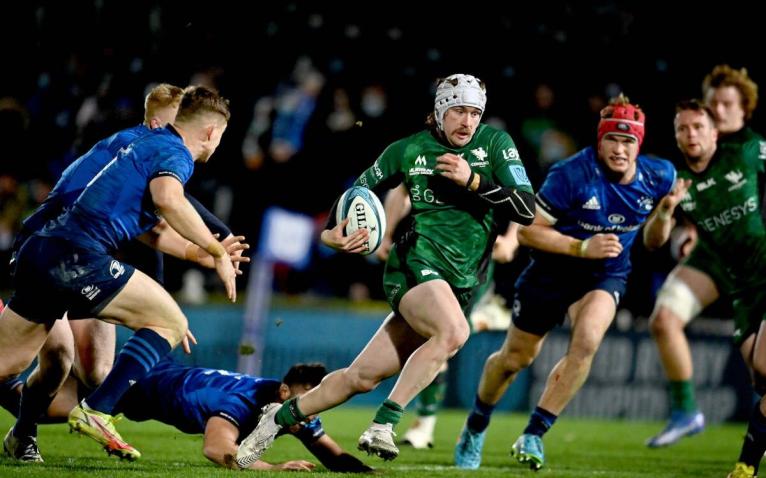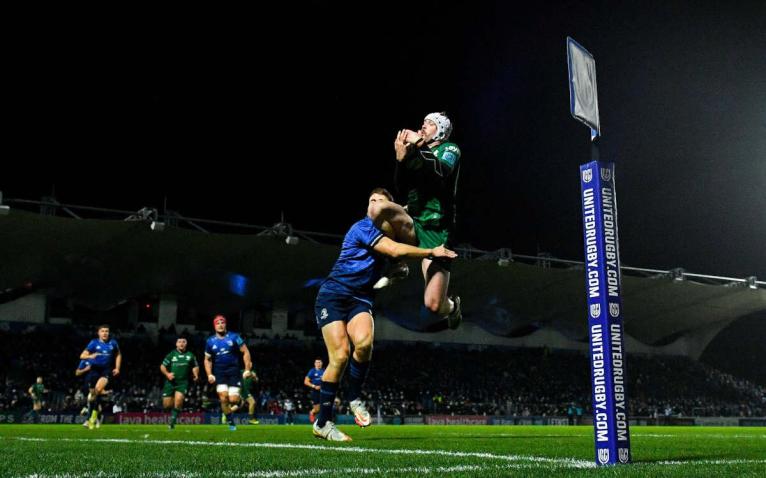Mack Hansen is back where it all began, reliving the past as he looks to the future. Ireland’s winger is sucking in the air his mother breathed, putting down roots in the country she left as a seven-year-old, discovering things he never knew about her while learning a little about himself. Part of him wonders back to the journey that seven-year-old made, hers a story of emigration rather than rugby.
You see to understand Hansen, and how and why he has become the most exciting newcomer on the Ireland scene, you first need to understand the dynamics of 1960s Ireland, of parents leaving home to find work, troubled by a dilemma so many in that generation were hit with, to either stay where their roots were or move to a place where there’s work, money and no worries about children going hungry.
Seven-year-old Diana O’Shea from Castlemartyr in Cork would grow up, get married and become Diana Hansen. Her father in law, Kevin Hansen, was a rugby league man, capped once by Australia in 1949. Her brothers kept their Irish accents after landing in Sydney and she retained her innate sense of Irishness, irrespective of what her address was. So, after growing up in Sydney, she moved to Canberra, watched her boy, Mack, show promise as an out-half at school, cry with pride when he was signed by the Brumbies academy.
In Canberra being an academy player entailed training in the evenings, studying or working in the days. So, there was admiration when Diana saw her son set his alarm every morning for 5.30 to head off to work as an electrician knowing it would be 9.30 that night when he’d get home from the rugby field. It was a slog but there was a reason to it. The Brumbies had first shown an interest in him when he was 12, admiring his have-a-go attitude, his step, his ability to play 10, wing, or full-back. What they didn’t have an appreciation for was his willingness to dabble with electrics. “I was the worst sparky in Canberra,” Hansen joked. “I was literally terrible at it. They wouldn’t let me do any hard jobs at all.”
The Brumbies were more trusting once he had a rugby ball in his hands. Twenty-one times they picked him, seeing him score a hat-trick against the Waratahs, land a match-winning kick against the Reds, play five times for Australia Under 20s, all the while ignorant of the fact a woman called Diana O’Shea was the most important person in his life.
So what happens next is like one of those typical Paddywhackery jokes where this Australian walks into a bar called the RUC and ends up as an Irish international.

The simple version of the story is that Hansen, one day, pitched up for a beer and got chatting to bloke called Jackson Friend. Jackson is barman at the RUC, son of a man called Andy Friend, a former coach of the Brumbies, now in charge of Connacht. Connacht are in the market for a winger, the Brumbies don’t look like they are going to build their team around Hansen and as soon as the IRFU hear about Diana O’Shea’s story, and that this flashy winger has an Irish passport, a deal isn’t long being struck.
Dan McKellar, the Brumbies coach who wants to keep Hansen, doesn’t find out about the move until the paperwork is completed, deflating from their perspective; a bonus from Connacht’s.
The truth is he’d been on the Irish province’s radar for a couple of years before Hansen got chatting to Jackson Friend in a Canberra pub – but the better story is that Ireland landed one of the best wingers in rugby simply because he fancied a beer.
A year and a half ago no one in Ireland knew who Mack Hansen was. They never knew about the seven-year-old child leaving behind everything she’d known, the fields, the streets, the friends; the school.
And this has been a cracking story. A year and a half ago no one in Ireland knew who Mack Hansen was. They never knew about the seven-year-old child leaving behind everything she’d known, the fields, the streets, the friends; the school. We can only imagine the inner turmoil of a child as she held onto her belongings and her father’s hand, the train ride from Cork to Dublin, the plane journey that went on forever, the strange accents and blinding sunshine of this new place she had to live in.
Imagine then, decades later, what it’s like when she finds out her son has a chance to go home. Imagine how she feels when he makes his home debut against the Bulls, when he shapes to go left and instead turns right, when he slaloms his way past two lurking South Africans, when he feints to chip but proves again to be a master of disguise as he darts through a gap on his way to score a try that started on his 10-metre line and ended in Connacht legend.
Along with Hansen’s grandmother, Bettie, the alarm kept getting set for the wee hours of the morning, Australian time, for the 20 Connacht and Ireland matches Hansen played in last season. You see Bettie is Hansen’s biggest fan. “She might not a whizz with a computer but someone sets up the match for her,” Hansen said.
There was plenty to see. Hansen and Connacht played Ulster in the Aviva Stadium last October. He scored twice, his footwork the best the stadium had seen since Lada Gaga played there a decade earlier.

A month later Ireland called and back in Canberra a mother’s heart swelled.
He’d win man of the match on his Six Nations debut against Wales, choke up with tears when interviewed by the national broadcaster, RTE, afterwards, expressing his pride in being Irish despite being the possessor of a thick Aussie accent.
Is this real, some people wondered? A week later they knew he was when he scored the try heard around the world against France, collecting Joey Carbery’s restart on the run before racing to the line.
Suddenly a lot more Irish people wanted to learn about their adopted son. We’d learn about his shortcomings with electrics but ability to connect with children. “After being a sparky, I worked in a kindergarten, $35 an hour. I’d long hair at the time and I let the kids play with it. It was fun, the easiest money I ever made.”
One of the issues in Irish rugby is that too many players are samey, robotic. It’s no surprise that the three most exciting players are on the roster are from completely different backgrounds to the private school production line.
He’s making a fair bit more than $35-an-hour now, Connacht ripping up his contract before the end of last season and handing him a new, fresh deal that keeps him in Galway until 2025. There he’s a cult hero among the ultras in the Clan Stand. “We get six thousand at games but it sounds like 20,000,” Hansen said.
It’s a home from home, his house on the outskirts of Galway city, giving him easy access to the sea. If it’s wet – and it is no secret that it does rain every now and then on Ireland’s western seaboard – then life doesn’t cease to be entertaining because Hansen’s housemates are Connacht team mates, Jordy Duggan, Oisin Dowling and Jack Aungier.
Already boasting trinity knot tattoos prior to arriving in Ireland he has since had a picture of Dowling’s face imprinted on his leg.
That’s Hansen. And you could say that’s Connacht. Shy of the money everyone else has in Ireland, they survive on spirit and – in coach Friend’s words – ‘finding a raw diamond and polishing it’.
That’s Hansen. One of the issues in Irish rugby is that too many players are samey, robotic. It’s no surprise that the three most exciting players are on the roster are from completely different backgrounds to the private school production line, Hansen from Australia, James Lowe from New Zealand,and Keith Earls, the one true working class boy in the squad.

This is what Connacht’s assistant coach, Pete Wilkins, said about Hansen last season: “While he may be a relaxed character and have that ability to take things in his stride, he doesn’t leave things to chance in terms of his preparation as a professional. It is nice to have that blend in a player, particularly an outside back, where you are looking for that bit of excitement, ability to back yourself, to take calculated risk, and make the most of opportunities.”
He has done. Following up from the man of the match display versus Wales and the restart try versus France, there have been four more caps, four more wins, including two historic ones in New Zealand. That Ireland’s revival on that summer tour coincided with Hansen’s recovery from Covid after a first-test hammering is no coincidence.
“Well, he is a smart rugby player,” said Andy Farrell of his new discovery. “He has got all the skill, is nice and calm in his manner on the field and he tends to see pictures nice and early because he is ahead of the game. He has played quite a bit of rugby as a 15; maybe something we will look at down the line with him as well.”
Everyone here has a bit of a chip on their shoulder. While it’s one thing being the underdog, it’s another to settle for second best. We don’t want to be known as the little guys of Ireland.
Hansen on Connacht
Moving to 15 seems inevitable as Ireland have a labour shortage there once you go beyond Hugo Keenan. But moving from Connacht is not on the agenda.
“Everyone here has a bit of a chip on their shoulder,” Hansen said last season, before stopping himself. While it’s one thing being the underdog, it’s another to settle for second best.
And that’s not what either he or Connacht want. “We don’t want to be known as the little guys of Ireland,” he said.
He has spoken before how he feels a debt of gratitude to the club who took a punt on a guy they didn’t know much about, how the warmth of the people in Galway conflicts with the wintry temperatures.



Mikey Lowry is clearly behind Keenan in the roster